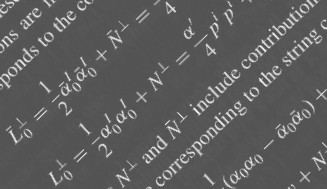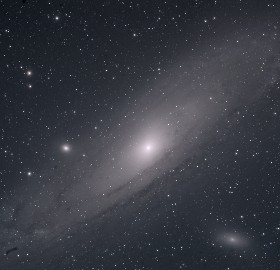
|
science commentary
Is the universe mathematical?We use mathematics to deconstruct the universe. Could it also build one?by T.J. Nelson |

|
science commentary
Is the universe mathematical?We use mathematics to deconstruct the universe. Could it also build one?by T.J. Nelson |
 hysicists are fond of talking about wave functions. There's an entire industry
devoted to explaining how every event is a wave function, and how ‘decoherence’
of the wave function, which happens when it interacts with other objects,
is what constitutes consciousness itself. Some say the universe is really just a
big ‘wave function’, a wave that must be observed before it changes
into a physical thing.
hysicists are fond of talking about wave functions. There's an entire industry
devoted to explaining how every event is a wave function, and how ‘decoherence’
of the wave function, which happens when it interacts with other objects,
is what constitutes consciousness itself. Some say the universe is really just a
big ‘wave function’, a wave that must be observed before it changes
into a physical thing.
The implications are enormous. If it were true, it might mean that some supernaturally powerful being had to observe the universe in order for it to exist. This kind of speculation can be very valuable, because it can lead to new ideas. In science we try not to discourage out-of-the-box thinking. Perhaps, we say, it only seems crazy because we don't have a good vocabulary for it. But sometimes crazy stuff is just crank science, so we need to be skeptical.
We think of Heidegger as the philosopher who struggled mightily with the concept of existence, or ‘Being’ as philosophers call it. But the question of ‘What is reality?’ has been around for ages. The Buddhist doctrine of Two Truths, developed by the Indian philosopher Nagarjuna, teaches that there are no distinctive beings or objects. Their famous example is a cart being disassembled. The point at which it stops being a cart and starts being a collection of small parts is determined only in the mind of the observer. The owner of the ex-cart, who perceives it in instrumentalist terms, will have a different opinion than the philosopher. Hence the philosophical conundrum: “What the hell did you do to my cart, you *******!”
The doctrine of two truths is the basis for the Buddhist idea of anatman, or the non-existence of self. In this theory, being is a field of ever-changing conditions; the actual phenomena are merely collections, meaningless except as the results of other phenomena from which they originate. The concept of ‘self’ is devoid of any fundamental meaning because ‘self-ness’ is not a substantive thing, only a conventional, i.e. derivative, one.

Western philosophy, specifically ontology or the study of being, has similar ideas, but in recent years it has turned to mathematics. The French continental philosopher Alain Badiou concluded that ontology is mathematics. He described existence or ‘Being’ as a mathematical set, and said that Cantor's set theory is an ideal way of expressing philosophical thought.
In both these cases, the referential distinction is clear; it is never claimed that Being is mathematics, only that mathematics is descriptive. The mathematical view is just a different viewpoint, equivalent to language, that can give us a unique perspective.
When we use mathematics in our daily life, we are also using it descriptively. For example, when you walk down the street, saying things like “E = mc2,” you're talking about energy in general, and expressing a concept about its relationship with matter. We recognize that energy can do whatever it wants, and we are making generalizations about how its behavior follows certain patterns. Math is just a language that gives you a definite answer you can use to make predictions.
But mathematics is also a way of expressing connections between different phenomena, which can be very deep. For example, the connection between charge and electromagnetism, and between sine waves and exponentials, out of which pops our own Western-style koan: “What number, when multiplied by itself, gives you less than nothing?”, are best expressed and understood using mathematics, and the relationships among mathematical structures are strikingly similar to those in the real world.
On a much larger scale, mathematics could be a set of instructions for creating the universe. But a set of instructions is abstract. It can express things that don't exist. It can get us into impossible situations, where the mathematical representation fails, forcing us to perform unsavory acts on it, like renormalization, to make the equations behave.
Physicist Max Tegmark has made himself a popular figure on science documentaries with his claim that the universe is actually, physically, literally composed of mathematics. It's an exciting idea, but it's not clear how it would work. The idea is either profoundly insightful or profoundly mad; I'm not sure which. But for sure it would have to be something completely different than the kind of mathematics we're familiar with—as they say on Star Trek, Something Totally Unknown.
We use mathematics to deconstruct the universe. So maybe what we would need to construct it is something opposite: antimathematics.*
We might be tempted to say that mathematics is somehow Being that is folded up or unmanifested, as the Hindus say; when the universe comes into being, the mathematical truths become manifest. But even here we run into problems.
Nevertheless, some physicists are convinced that a single equation could describe the whole universe. To be useful, it would have to have fewer terms than a summation of the equations describing every particle in it. But even then it wouldn't be the actual universe—it would be a vastly (in fact, infinitely) simplified representation of it.
Paul Davies once said the universe contains 10122 bits of information. Elsewhere, it is said that a single qubit, or quantum bit, which is planned for the next generation of computers, contains an infinite amount of information. If that is true, the amount of information in the universe is infinite. Any equation, no matter how complex, would only be a cheap copy, no more identical to it than the word ‘universe’ itself.
If this were not so, if it were ordinary math, then by writing down the equation for the universe, we would create a new one. If the universe were mathematics, creating more mathematics would create more universes. So does this mathematics already exist out there, undiscovered? Or is our universe like an onion of multiple sub-universes, each infinite, each of which contains some smart astrophysicist (sorry, I just love that joke) who created the next by writing down its equation? If the astrophysicist then erases a term, does the subuniverse then cease to exist?
I don't know. I've given myself a headache now. But I suspect not.
* Completely different from what this mathematician is proposing.
What's so great about Euler's formula?
To many people, Euler's identity seems almost magical. What does
Euler's formula tell us about the real world? How can we understand
it intuitively?
What Does Science Say About Life After Death?
The Buddhists had a lot to say about the afterlife, but science
is starting to catch up.
The Tragic Story of Schrodinger's Cat
Schrödinger's cat played a critical role in the early development
of quantum mechanics. His paper on the subject, published in 1935 in
the prestigious journal Naturwissenschaften, established his reputation
as a first-rate theoretical physicist.
Buddhism as Philosophy
by Mark Siderits
Our Mathematical Universe
by Max Tegmark
